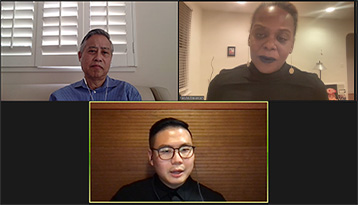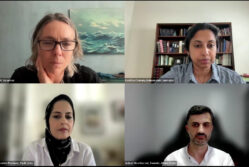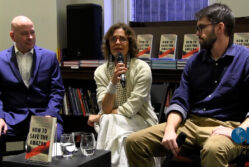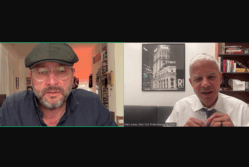Event Coverage Highlight

‘How I Did It’: Marcus Yam Discusses Covering Global Conflict for the LA Times
 by Chad Bouchard
by Chad Bouchard
In early 2020, Los Angeles Times photographer Marcus Yam was feeling restless and stuck in a career rut. He sought advice from Norman Pearlstine, the paper’s executive editor at the time, who urged Yam to consider becoming a foreign correspondent.
“When he said that, my jaw just dropped,” Yam said during an OPC program on Jan. 12 to discuss his work. “Because in our business, these opportunities are so rare, for photographers at least, and it almost never happens.”
As the COVID-19 pandemic took hold and protests following George Floyd’s murder dominated U.S. headlines, Yam was starting trial runs as correspondent abroad. The paper’s executive director of photography, Calvin Hom, said he wasn’t enthusiastic about the idea at first, as Yam had been Hom’s go-to photographer for major news assignments.
“And here’s Marcus, going off temporarily to South Korea, and it just didn’t sit well with me. I said, ‘I think it’s great for you, but I’m not sure it’s great for me,’” he said. “It took me a while to come around on that. And it turns out, I hate to admit, that I was probably wrong.”
The program, moderated by OPC Governor Sandra Stevenson, deputy director of photography at The Washington Post, is part of the OPC’s “How I Did It Series,” which features successful journalists discussing their work and process with their editors and producers.
Yam said the pandemic forced journalists to reinvent the role of foreign correspondent. He found himself stuck in South Korea, hamstrung by travel restrictions.
“I told Calvin that ‘I don’t think I’m doing very well, and I need to keep moving and need to be productive. I don’t want to sit somewhere and not do anything,” he said. “So we basically just hit the road and went to places without any coronavirus restrictions. It so happened that took us to some of the roughest places with the toughest assignments.”
His newly conceived job as roving global visual correspondent took him to Gaza, Ukraine, and three separate trips to Afghanistan. The new job description forced him to pitch story ideas rather than merely follow assignments he received, he said.
“It’s actually done me a lot of good, journalistically. It’s the best thing ever to be put in that kind of test. It’s almost like baptism by fire,” he said. On one of his trips to Afghanistan, he found himself on his own for a week before his writing partner arrived. “I was the only one representing the Times in the country at that point.”
In 2022, Yam won the Pulitzer Prize for Breaking News Photography for images documenting the U.S. departure from Afghanistan.
He has faced dangerous and traumatic conditions during the course of his work. Yam and Hom discussed the need for mental health checks and treatment.
“When [Yam] was in Ukraine, because he was photographing all these gruesome things, a heart that was blown into the middle of a road from a Russian soldier, beheaded bodies on railroad tracks, all that stuff. And I would say to Marcus, ‘are you OK?’” he said. But Yam did not immediately recognize the need for help. When Hom offered for the paper to pay for a therapist, Yam initially declined.
In Ukraine, he stepped on a trip wire that set off a booby trap near a river that had been set by Ukrainians to protect against Russian ambushes. It turned out to be connected only to a flash-bang instead of explosives.
“I remember that moment played out in my head for several weeks. That split second became more than minutes. And I was with a fellow photographer who was roaming around with me for safety,” he said. “I remember in that moment we looked at each other and I felt immense guilt for having placed that photographer next to me.”
He called Hom immediately to talk about the incident, and then called a therapist, “and worked out the steps on how to pack this away and how to be operational, basically.”
Hom said he was firm with Yam about taking care of himself and focus on safety after the incident. “It’s not worth dying for, Marcus,” he recalled saying. “Come out. Take care of yourself. Get some help.” And unlike in his earlier stints in Afghanistan, Yam did take steps to care for his wellbeing.
Click the link below to watch a playlist of clips from the program.



